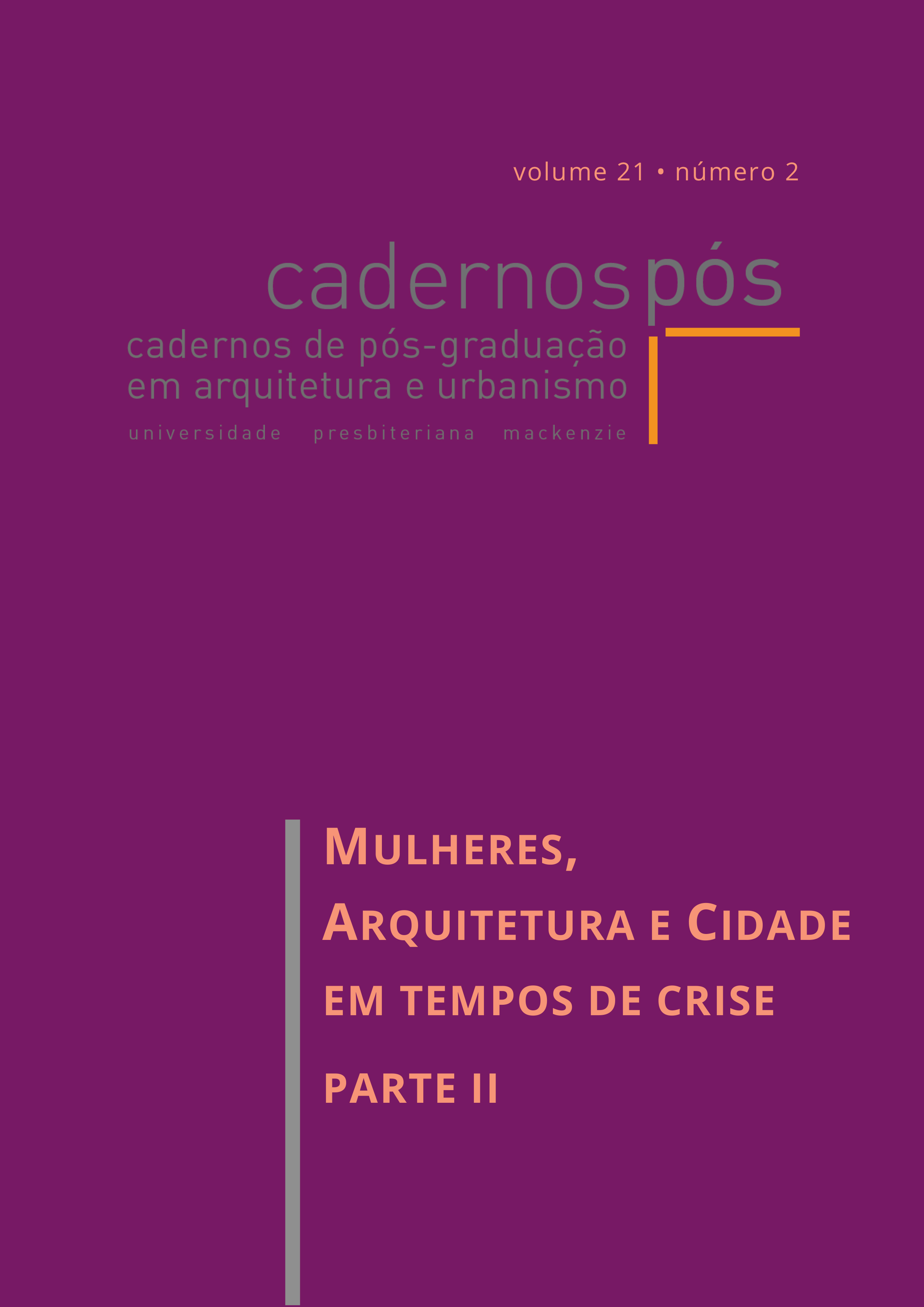The Situated Knowledges of the Practice of the Women Architects in the Northeast of Brazil
DOI:
https://doi.org/10.5935/cadernospos.v21n2p107-127Keywords:
Situated knowledges; Gender; Regionalism; Postmodernism; Popular architecture.Abstract
This article was developed within the scope of the research project "Female architects in the Brazilian Northeast: migrations, regionalism and gender”, and aims to explore the theme of situated knowledges (HARAWAY, 1995) in the popular architectural field as a professional strategy used by female architects in the Brazilian Northeast. For this, a critical resumption of the experience of the Arquitetura 4 firm was made – one of the first entirely female architects teams to emerge in the city of Recife – from the 1970s and, after analyzing its trajectory, it was concluded that this group subverted the previous generation by using Northeastern popular architectural images reinterpreted in the light of regionalist and postmodernist currents ideas, in order to differentiate themselves from their male pairs and dispute in the competitive architectural field, by that time, mostly male.
Downloads
References
ALBUQUERQUE JR., D. M. A invenção do Nordeste e outras artes. Prefácio de Margareth Rago. 4. ed. rev. São Paulo: Cortez, 2009.
ARQUITETURA: uma profissão ainda discriminada para mulheres. Diário de Pernambuco, Recife, 11 dez. 1979. Disponível em: http://memoria.bn.br/DocReader/029033_15/147183. Acesso em: 30 ago. 2020.
COSTA, C. O pós-moderno na arquitetura nordestina (1985-2000). 2012. Dissertação (Mestrado em Arquitetura e Urbanismo) – Universidade Federal do Rio Grande do Norte, Natal, 2012.
COSTA, J. Feito com as mãos. [Anotação pessoal sobre o artesanato]. Recife, jun. 2003.
EGGENER, K. Placing resistance: a critique of critical regionalism. In: CANIZARO V. B. (ed.). Architectural regionalism: collected writtings on place, identity, modernity and tradition. New York: Princeton Architectural Press, 2007. p. 395-407.
GÁTI, A. H. Arte e artesanato na arquitetura de interiores moderna de Janete Costa. 2014. Dissertação (Mestrado em Desenvolvimento Urbano) – Universidade Federal de Pernambuco, Recife, 2014.
GÁTI, A. H. Esposas: a consorte nas parcerias profissionais entre arquitetos. Revista Arquitetas Invisíveis, Brasília, v. II, p. 23-26, 2018.
GONÇALVES, G. M. Entrevista a Guilah Naslavsky em 1 set. 2020.
GÜREL, M. Ö.; ANTHONY, K. H. The canon and the void: gender, race, and architectural history texts. Journal of Architectural Education, v. 59, p. 66-76, 2006.
HARAWAY, D. Saberes localizados: a questão da ciência para o feminismo e o privilégio da perspectiva parcial. Cadernos Pagu, n. 5, p. 7-41, 1995.
HEYNEN, H. Anonymous architecture as counter image: Sibyl Moholy-Nagy's perspective on American vernacular. The Journal of Architecture, v. 113, n. 4, 469-491, 2008.
HEYNEN, H. Genius, gender and architecture: the star system as exemplified in the Pritzker. KU Leuven University Library, Feb. 2013.
HEYNEN, H.; WRIGHT, G. (2012). Introduction: shifting paradigms and concerns. In: CRYSLER, C. G.; CAIRNS, S.; HEYNEN, H. (ed.). The Sage handbook of architectural theory. London: Sage, 2012.
LAPROVITERA, E. L’architcte et le people à Recife (Brésil): 1959-2009. École des Hautes Études en Sciences Sociales. Paris, 2009.
LEE, R.; SIDDIQI, A. A woman’s situation: transnational mobility and gendered practice. In: CFP: EAHN, Talin, 2018. Disponível em: https://www.academia.edu/33845580/CFP_EAHN_Tallinn_2018_A_Woman_s_Situation_Transnational_Mobility_and_Gendered_Practice. Acesso em: 30 set. 2017.
LIMA, A. G. G. Arquitetas e arquiteturas na América Latina do século XX. São Paulo: Altamira, 2014.
MARQUES, S. Maestro sem orquestra: um estudo da ideologia do arquiteto no Brasil – 1820-1950. 1983. Dissertação (Mestrado em Sociologia) – Universidade Federal de Pernambuco, Recife, 1983.
MARQUES, S. Entrevista a Guilah Naslavsky, 2016.
MOTA, N.; MESQUITA, L. Métodos construtivos tradicionais do Nordeste. Recife:
UFPE/Sudene, mimeo, 1978.
MOHOLY-NAGY, S. Native genius in anonymous architecture. New York: Horizon Press, 1957.
MUNIZ, M. B. O escritório Arquitetura 4: continuidade e mudança na arquitetura residencial no NE (1973-1997). 2009. Monografia (Trabalho de Conclusão de Curso) – Universidade Federal de Pernambuco, Recife, 2009.
MUNIZ, M. B. A experiência residencial na obra de Vera Pires e Roberto Ghione: 1998-2012. 2012. Dissertação (Conclusão de Curso) – Universidade Federal de Pernambuco, Recife, 2012.
NASLAVSKY, G.; MARIZ, M. L. As “outras” do outro: pioneiras arquitetas no Nordeste brasileiro: migrações, gênero e regionalismo. In: SEMINÁRIO DOCOMOMO BRASIL, 13., 2019, Salvador. Resumos [...]. Salvador: Instituto dos Arquitetos do Brasil, 2019.
PEDROSA, M. Arquitetura moderna no Brasil (1953). In: AMARAL, A. (org.). Dos murais de Portinari aos espaços de Brasília. São Paulo: Perspectiva, 1981. p. 255-264.
PIRES, V. Arquitetura 4: Casa de praia, Porto de Galinhas, 1987. Simetria clássica. Modernidade e classicismo tropical. Recife, 23 ago. 2020. Disponível em: https://www.facebook.com/permalink.php?story_fbid=129662508837797&id=100053821449801. Acesso em: 25 jan. 2021.
RISÉRIO, A. Avant-garde na Bahia. São Paulo: Instituto Lina Bo Bardi e Pietro Maria Bardi, 1995. 259 p.
ROCHA, E. de O. Entrevista a Guilah Naslavsky, 2016.
SILVA, M. de. The life and work of an Asian woman architect. Colombo, 1998. v. 1.
SOUZA, D. B. I. de. Reconstruindo Cajueiro Seco: arquitetura, política e cultura popular em Pernambuco (1960-64). São Paulo: Annablume, 2010. 218 p.
TORRE, S. Teaching architectural history in Latin America: the effusive unifying architectural discourse. Journal of the Society of Architectural Historians, v. 61, n. 4, p. 549-558, Dec. 2002. Disponível em: http://www.jstor.org/stable/991875. Acesso em 7.12.2015.
VENTURI, R. Complexidade e contradição em arquitetura. São Paulo: Martins Fontes, 1995.
WAISMAN, M. La mujer en la arquitetura. Revista de la Universidad Nacional de Córdoba, n. 1-2, p. 379-395 jun. 1969.
WAISMAN, M. O interior da história: historiografia para uso de latino-americanos. São Paulo: Perspectiva, 2013.
WEIMER, G. Arquitetura popular brasileira. São Paulo: Martins Fontes, 2005.
WOLF, J. Arquitetura 4. Sob inspiração da paisagem regional. Revista AU, São Paulo, n. 22, fev./mar. 1989.
WRIGHT, G. On the fringe of the profession. Women in American architecture. Spiro Kostof (dir.), The Architect. Chapters in the history of the profession. New York: Oxford University Press, 1977.
Downloads
Published
How to Cite
Issue
Section
License
Authors who publish in this journal agree to the following terms:
a) Authors retain the copyright and grant the journal the right of first publication, with the Project simultaneously licensed under the Creative Commons Attribution License that allows the sharing of the Project with recognition of the authorship and initial publication in this journal.
b) Authors are authorized to assume additional contracts separately for the non-exclusive distribution of the version of the Project published in this journal (e.g., publishing in an institutional repository or as a book chapter), indicating that it was originally published in this journal, with a link to the article.








 Todo o conteúdo de Cadernos de Pós-Graduação em Arquitetura e Urbanismo está licenciado sob
Todo o conteúdo de Cadernos de Pós-Graduação em Arquitetura e Urbanismo está licenciado sob 